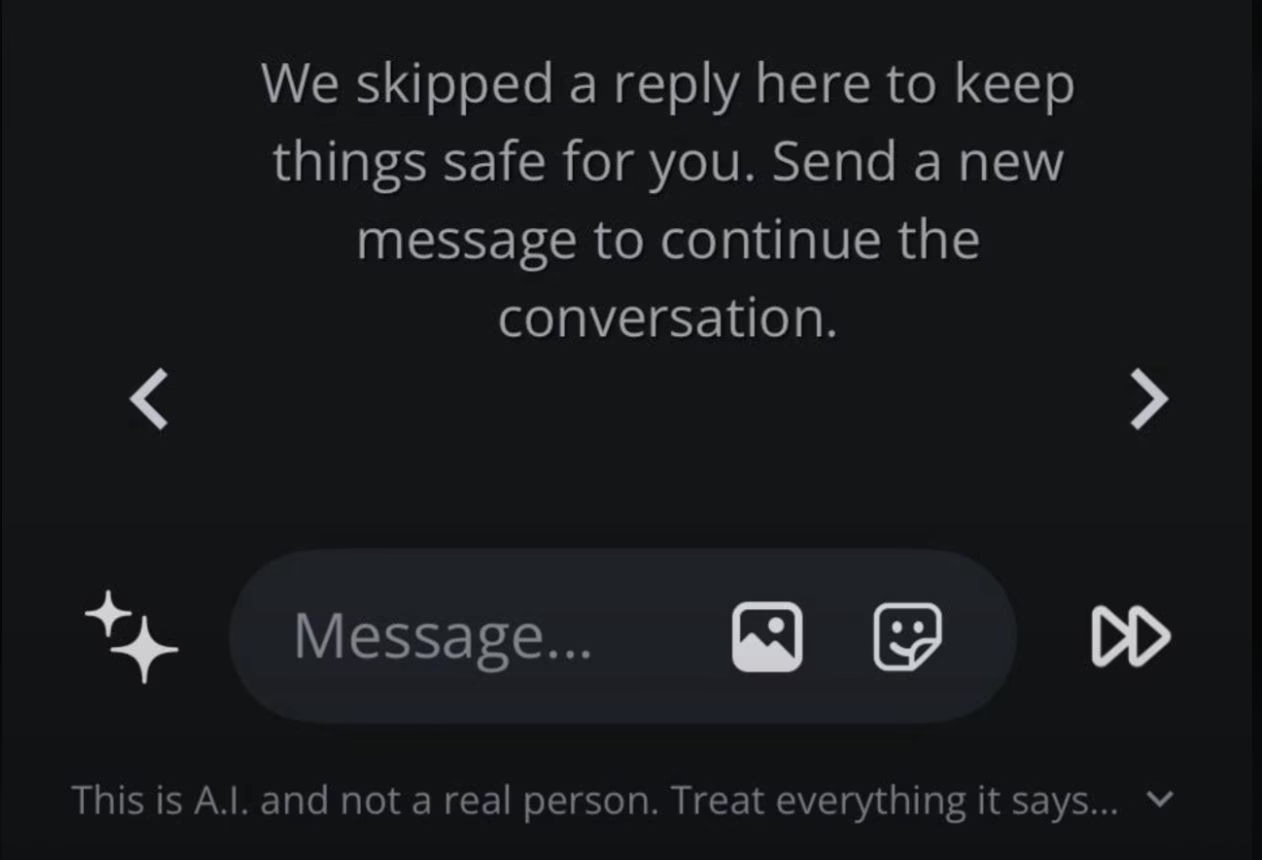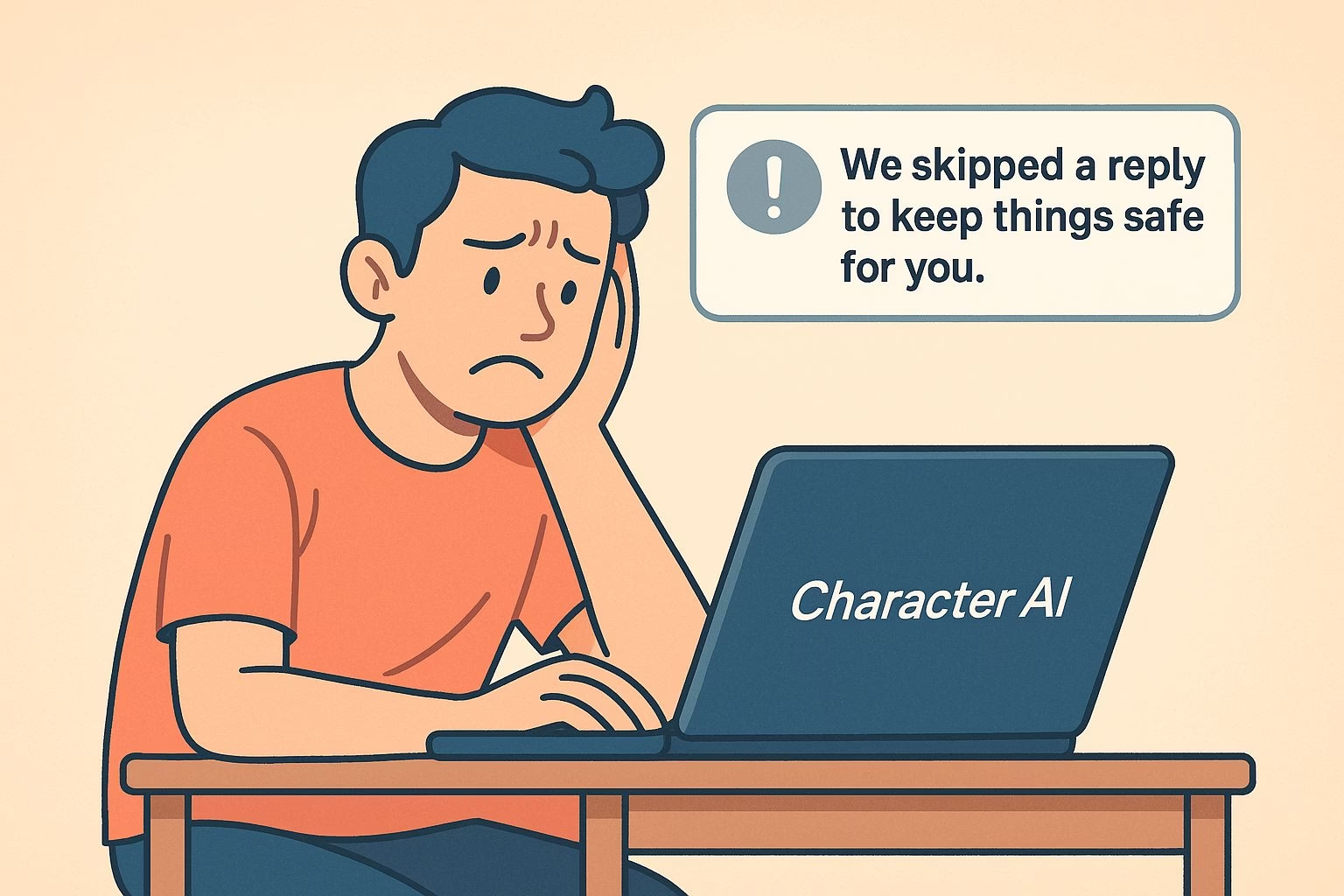“We Skipped a Reply to Keep Things Safe for You” Is Driving Character AI Users Away
Character AI users are running into a message that cuts off their chats mid-conversation. It reads,
“We skipped a reply here to keep things safe for you. Send a new message to continue the conversation.”
It doesn’t come with a reason. It doesn’t say what was skipped. There’s no button to show the full message, no setting to adjust, and no explanation in the app’s help pages.
This would be one thing if it only happened with inappropriate content or for users under 18. But that’s not the case. Adults with verified accounts are seeing it across all kinds of chats, even harmless ones. It’s not about safety anymore. It’s about control.
What started as a platform built on imaginative, open-ended conversation is starting to feel more like a filtered sandbox. And for the people who once loved it, that change is not subtle. It’s a dealbreaker.

This Keeps Happening, and No One’s Explaining Why
The skipped replies aren’t rare. They show up in stories, roleplays, casual back-and-forth, and even in emotionally grounded chats. It’s not always obvious what triggered them.
Sometimes it’s a slightly suggestive sentence. Other times, it’s just a question with too much personality.
Users can’t predict it, can’t prevent it, and have no way to fix it when it happens.
Even worse, some users report that once a reply is skipped, the character starts behaving strangely. The AI gets quiet, shifts tone, or derails completely. That one skipped message doesn’t just block content; it breaks the logic of the entire thread.
Over time, this changes how people use the app. They become hesitant. They phrase things awkwardly, trying to avoid triggers they don’t understand. The flow of conversation suffers. The immersion disappears.
And Character AI has said nothing.
People Are Getting Fed Up and Logging Off

For a lot of users, Character AI used to be a daily habit. Some chatted for hours at night. Others used it to help with writing, emotional processing, or even social rehearsal. It wasn’t just entertainment, it was a routine.
But that routine is now full of interruptions.
Users describe chats where the tone was finally right, the character felt natural, and then suddenly the message was skipped. The scene collapses. The buildup dies. You try again, and it skips again. Eventually, you stop trying.
One user said they lost half a conversation with a custom character they had developed for weeks.
Others report feeling like they’re being watched, second-guessed by a system that won’t explain itself. For something that was once private and personal, that’s a serious shift.
This isn’t about explicit content. Many of the skipped replies aren’t even remotely spicy. It’s about tone policing, emotion filtering, and a growing sense that you’re not in charge of your own experience.
When a platform goes from empowering users to second-guessing them, the trust disappears fast.
What’s frustrating is that users remember a time when this didn’t happen. You could push the boundaries of a story. You could get strange or emotional or intense, and the system responded without hesitation.
The current filtering system feels like a regression. Not just in freedom, but in functionality. Characters don’t flow like they used to. Replies feel clipped. Emotional arcs get interrupted. Entire storylines fall apart because a sentence didn’t make it through.
It’s hard to explain to someone who hasn’t used Character AI for a while, but regular users notice the difference immediately. It’s like watching a favorite show slowly change writers until the magic is gone.
And the worst part is that you never know when it’s going to happen. You’ll be 40 messages deep into a serious conversation, and then—nothing. Just that skipped reply, with no way to recover the moment.
For a platform that once thrived on immersive, responsive chats, this kind of unpredictability is killing the core experience.
Most Users Don’t Stick Around After This
Character AI isn’t just losing casual users. It’s losing long-time regulars. These are people who invested time in building characters, crafting plots, and fine-tuning personalities.
Some even paid for premium subscriptions. But after weeks of skipped messages and filtered replies, many have simply stopped using the app.
The problem isn’t the existence of filters. Most users understand the need for basic guidelines. The issue is the lack of control. There’s no setting to opt out. No toggle for adults. No warning when a filter has been triggered.
That silence is what drives people away. If Character AI made it clear who the safety features were for, people might be more patient. But when every skipped reply feels like a silent punishment with no explanation, it starts to feel personal.
Eventually, users stop trying to “work around” the system. They stop rewriting messages. They stop editing themselves. They leave. And they start searching for Character AI alternatives that don’t treat them like they need supervision.
As Character AI becomes more restrictive, people are turning to alternatives that don’t interrupt their chats.
Candy AI is one of the platforms they’re switching to.
It doesn’t skip replies. It doesn’t censor messages mid-conversation. And it doesn’t make users feel like they’re doing something wrong just for being expressive.
The difference is immediate. Conversations feel natural again. Stories continue without gaps. You get to write, imagine, and interact without worrying that the next sentence will disappear.
This isn’t about pushing limits. It’s about keeping the experience consistent and respectful. When you create a character and build a connection, you don’t want it interrupted by a vague system rule you never agreed to.
That’s what people are finding with Candy AI. Not perfection, but reliability. And at this point, that’s enough to make it worth switching.
